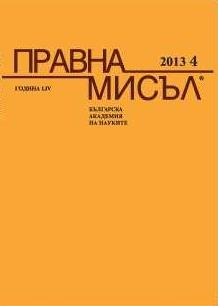Поощрителните норми в наказателното право на Европейския съюз
Promotional norms in the criminal law of the European Union
Author(s): Rumen MarkovSubject(s): Law, Constitution, Jurisprudence
Published by: Институт за държавата и правото - Българска академия на науките
Summary/Abstract: The term "promotional (incentive) norms in the criminal law" is defined in the article. This kind of norms are created to stimulate the subject of criminal activity to subsequent lawful behavior through the release of arisen criminal liability or its mitigation. The norms in the criminal law of the EU, classified as incentive, are exhaustively listed. These are contained in the Framework Decision on the Fight against Terrorism, Drug Trafficking and Organized Crime. The lawful activity has been described in the promotional norms in the criminal law of the EU. The offender, firstly, has to renounce his own crime act and secondly, has to provide the administrative or judicial authorities with information which they would not otherwise have been able to obtain, helping them to: prevent or mitigate the effects of the offense; identify or bring to justice the other offenders; find evidence or prevent further offences - terrorism, drug trafficking and organized crime. The subsequent nature of the positive act, described in the promotional norms in the criminal law, is their important feature. The positive behavior always takes place after the criminal act and arisen criminal liability of the refusing himself subject. We can differentiate between three groups of previous criminal activity in the criminal acts of the EU containing incentive norms. The first group is the "classic" (by its nature) completed crimes. The second group includes forms of preliminary criminal activity, elevated in separated completed crimes - preparation and related with criminal communities - leading a "terrorist group" and the formation of a "criminal organization". The attempt on some crimes constitutes the third group of predicate offense. The article deals also with the issue of lines of criminal law defense -"basic" and "specific". It is known that the "basic line" consists in preventing crimes. Along with in the "basic line" to prevent crime, criminal law defense has been realized in another, let us call it "specific line". This is a line of countering the actual present crime when not prevented. It is about prevention, mitigation and reparation the effects of the offense. The promotional norms in the criminal law of the EU with a focus on prevention and mitigation of the consequences of the offense are analyzed in detail. The preventing promotional norms are most effective. Firstly, the preventive effect has been achieved after a realized attempt, converted into a third group of predicate offenses. Another option to prevent criminal consequences is one in which the information provided in its content helps "to prevent further offences", if preliminary criminal activity for their facilitation was carried out (the second group of the predicate offenses). The promotional norms in the criminal law are not the only means of countering already committed criminal offenses. Some of them contribute to the more effective implementation of the "basic" line of defense to prev
Journal: Правна мисъл
- Issue Year: LIV/2013
- Issue No: 4
- Page Range: 55-75
- Page Count: 21
- Language: Bulgarian
- Content File-PDF

